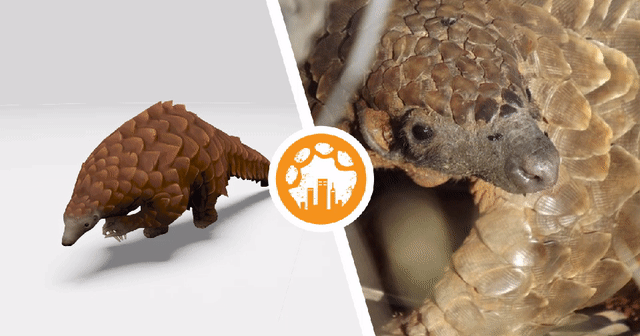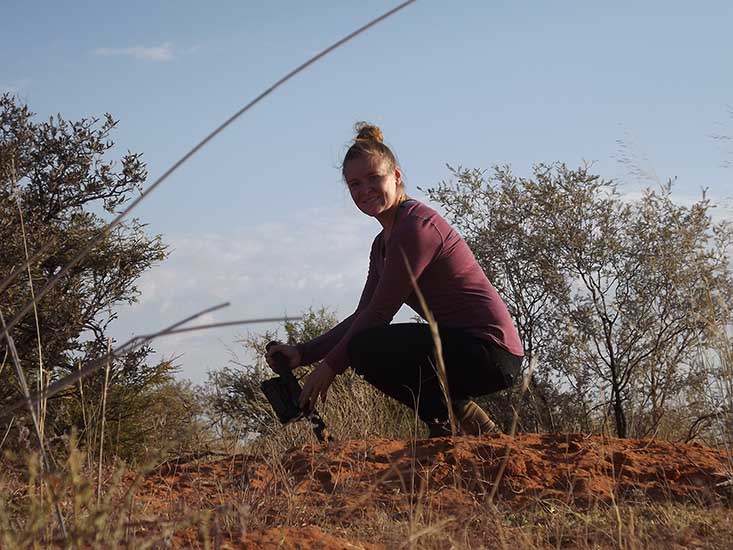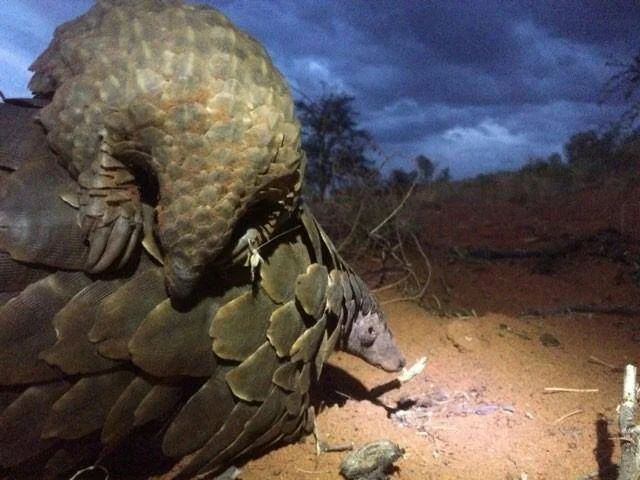Rockstar the Pangolin
This week we put the spotlight on our smallest app star, Rockstar the Pangolin. Don’t let her name fool you. Rockstar is shyer than most other Temminck’s pangolins of the Tswalu Kalahari Reserve, and likes to stay close to the creature comforts found in her area of the sand dunes. Like all pangolins, Rockstar curls into a ball so that her scales can protect her from predators. Sadly, it is these scales that make her species vulnerable to poaching. Rockstar is safe at home, however, as the Tswalu Foundation and University of Witwatersrand work to protect her from threats such as illegal trafficking and climate change.
Wendy Panaino, researcher at Tswalu Foundation, is really close to Rockstar through her work. "Rockstar is relatively shy when first approached. However, the more time I spend with her, the more she starts to warm up to my presence and goes about her nightly business as usual the longer I’m around. She does not stray too far out of her home range and she tends to choose burrows that occur on the same dune strip. The other study subjects utilize burrows across many dunes and habitats."
Researchers like Wendy locate the pangolins in their study area at least once a week, using VHF (Very High Frequency) telemetry. This technology allows a tagged animal to be detected from far distances. Once a pangolin’s burrow has been found, a camera trap is placed just outside its entrance in order to snap pictures of its activity. Tracking allows researchers to learn about many behaviours, such as preferred feeding locations and daily travel patterns.
BABY ALERT! In November of 2017, Wendy spotted Rockstar with a 2 month old pup on her back! Wendy sent us this message: "Hey SC team! Super exciting news!!!😀 I've recently learnt that Rockstar the pangolin has a 2 month old pup. Pangolin moms generally only bring their pups out roughly once a week when changing burrows, so I was incredibly lucky to catch them in the act." We are sooo pleased!
Pangolin Facts
There are eight different species of pangolin – four in Asia and four in Africa.
Pangolins are the most trafficked mammal in the world, primarily because their scales are used in traditional medicines.
Pangolins have extremely long, sticky tongues specialized to eat certain ant and termite species.
Once a pangolin curls into a ball, it is almost impossible for a predator to get through its tough scales. Lions and spotted hyenas are their primary predators in the southern Kalahari.
Pangolins walk on their hind legs and use their big, muscular tails for balance.
Pangolin mothers give birth to one pup at a time, carrying the baby on her back for about 4-6 months.
Rockstar's home: the Kalahari
Though typically thought of as a desert, the Kalahari region is covered in a wide diversity of vegetation types, ranging from the semi-arid savannas of the southern regions to the dense forests of Zaire. Tswalu Reserve, in South Africa, is arid savanna habitat consisting of undulating dune fields. These are occasionally interrupted by ‘Korannaberg hills,’ areas of higher elevation which receive higher rainfall than elsewhere in the Kalahari, leading to additional habitat diversity.
The Reserve also extends into the southern, or “Green,” Kalahari, where the climate spans the extremes. In winter, temperatures fall well below zero, while in summer they will often exceed 40 degrees (C). This climatic and geological variability has led to the evolution of a wonderfully diverse suite of animal and plant life, much of which is still little-known to science. Among the many species that occur in the Kalahari, there is one very charismatic species that clings on tenaciously in this unforgiving environment – the Temminck’s ground pangolin.
The Tswalu Foundation helps researchers to do crucial work for pangolin conservation
Tswalu Kalahari Reserve is South Africa’s largest private game reserve, spanning over 1,000 square kilometres and is owned by the Oppenheimer family. The vision for the reserve is to “restore the Kalahari to itself” and through a process of passive and active intervention, nature has been allowed to re-establish itself and strengthen and maintain its essential ecological processes.
The Tswalu Foundation was created in 2008 as a result of the forward thinking of Jonathan Oppenheimer and his love and interest in the Kalahari. His vision for the Foundation is to develop a platform upon which local and international visitors can contribute and become involved in community and environmental research on the reserve.
Through the Foundation we encourage guests to Tswalu Kalahari and individuals interested in the Kalahari to donate towards research projects on the reserve and the surrounding area. The Foundation creates the mechanism to either contribute to an existing research project or to suggest and fund specific research in areas of interest to the funder. The Foundation provides financial support and logistical support to students so as to develop long term research and monitoring programs on the reserve, thus contributing to the conservation and a greater understanding of the Kalahari.
Tswalu Kalahari Reserve acts as a major contributor to conservation of species and ecosystems in the Northern Cape, conserving numerous rare and endangered species. The reserve has a strong conservation ethic and numerous research projects have been sanctioned by the Oppenheimer family. These projects range from insects through to pangolin and contribute to our understanding of the uniqueness, complexity and diversity of this wonderful, arid land. Understanding the relationships and connectivity of ecosystems is one of the major challenges in modern ecology.
Although Tswalu Kalahari and the Oppenheimer family have supported several research projects in the past, it became evident that a vessel was required to ensure that more researchers were afforded the opportunity to study this unique land.
Buy more photo film and support the preservation of Pangolins
Pangolins are the most trafficked mammal in the world, primarily because their scales are used in traditional medicines. The 2016 CITES convention banned the pangolin trade, but the illegal market is escalating. Pangolins also face threats such as habitat loss and hunting. Very little is known about this rare animal, so research and public awareness are key to their protection.
Your donation to the Tswalu Foundation will help fund research into the ecology, behavior, and conservation of ground pangolins like Rockstar. Current research projects include investigations into the impact of climate change on pangolin habitat, and the design of pangolin-friendly fencing.
Try the app
Do you want to play around with Rockstar yourself? Download Safari Central from the App Store or Google Play!






